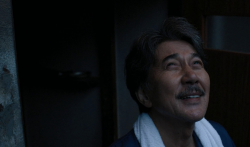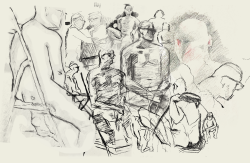With its Solo cup-throwing and crocheted blankets, atonal elevator music, yelling and crying, death and life, and truth and fiction, there is no doubt that Peter Sinn Nachtrieb’s boom, Nomadic Theatre’s first show of the season, is a messy play.
This production, directed by Johan Clarke (COL ’15), is busy to say the least, despite its three person cast. It’s a play about life after the apocalypse, but remains relevant pre-apocalypse.
Jo, played by Emily Lett (COL ’17), and Jules, played by Taylor Mansmann (COL ’15), meet under strange circumstances—an internet ad for casual sex turns out to be Jules’ plan to preserve the human race after the impending apocalypse. They are unlikely companions with wildly different personalities, dreams, and beliefs, but when the world does end, there is nothing for them but each other and a basement. This story is mingled with the story of Barbara, Sarah Frasco (COL ’15), who controls Jules and Jo with a series of levers and buttons from a museum exhibit—in the future.
The viewer enters the world of boom—and the theatre—through the future, passing through a futuristic museum exhibit of humanity, imagined by set designer Rachel Lesser (COL ’15). This set extends off of the stage, into the seating and entryway, adding to the boom’s sprawling feeling.
Once the audience moves past the artifacts they arrive at the main exhibit, which takes place in what looks like a Burleith basement. It is here that the end of the world unfolds for our characters.
While boom is most certainly a comedy, it also “brings a lot to the table philosophically,” according to Clarke. The play raises a number of complex issues, such as the existence of a god, the importance of science, the meaninglessness of death, and the beauty of destruction. At no point does it feel heavy, though. The cast, the lighting, and the set all keep up a bubbling energy that allows for serious thought and contemplation while constantly being on the edge of a joke.
With only three actors, and a play that covers such a vast range of topics and moods, Clarke’s cast has their work cut out for them. Frasco’s portrayal of the psychologically fragile museum guide, Barbara, is especially admirable. Situated in the background of the stage throughout the play, and with a fair amount of downtime, Frasco stays engaged and engaging.
When she is the center of the action, Frasco is both funny and unsettling, teetering between the calm professionalism of a tour guide, the caustic attitude of a bitter employee, and the concerned and disconcerting powerfulness of a benevolent god of some sort.
Lett’s embodiment of Jo, a cynical and lonely aspiring journalist, is natural. She moves about the stage with confidence, while allowing insecurity, fear, and anger to flit in and out of her character with agility. Over the course of the show, Jo seems to develop more nervous tics and anxious tendencies as the tension and exhaustion of post-apocalyptic survival wears on her.
Mansmann is endearingly dorky and desperate as Jules, a scientist who seems doomed to an unfortunate death based on his family history and, as such, is galvanized in his pursuit of survival.
Clarke notes that working with such a small cast is more intimate and says that it gave him “more control of the room.” That intimacy and control seems to have paid off—the cast plays off of each other well and effectively brings laughs and weighty moments in rapid, smooth succession, despite the messiness of the play itself.
With its successful overlapping of the two stories of futuristic museum and present apocalypse, and the two genres of comedy and philosophical wandering together, boom explodes into one enjoyable, cohesive production.
Walsh Black Box Theatre
Oct. 30-Nov. 1, Nov. 5-Nov. 8
performingarts.georgetown.edu
Photo by Megan Howell





